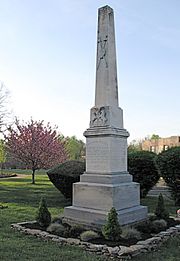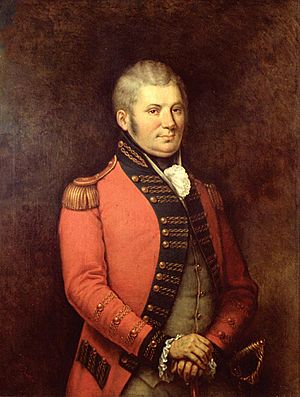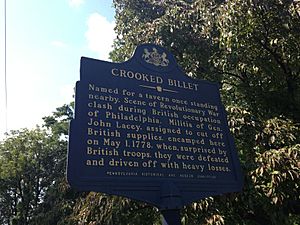Battle of Crooked Billet facts for kids
Quick facts for kids Battle of Crooked Billet |
|||||||
|---|---|---|---|---|---|---|---|
| Part of the American Revolutionary War | |||||||
 Battle of Crooked Billet monument |
|||||||
|
|||||||
| Belligerents | |||||||
| Commanders and leaders | |||||||
|
|
|||||||
| Strength | |||||||
| 300-500 | 850 | ||||||
| Casualties and losses | |||||||
| 26 killed 8 wounded 58 captured |
7 wounded | ||||||
The Battle of Crooked Billet was a small but important fight during the American Revolutionary War. It happened on May 1, 1778, near a place called Crooked Billet Tavern. This area is now Hatboro, Pennsylvania.
In this battle, British soldiers launched a surprise attack. They were led by Major John Graves Simcoe. Their target was Brigadier General John Lacey and his Pennsylvania militia. The British caught Lacey's troops by surprise, and they were forced to retreat. The British won this skirmish.
Contents
Why the Battle Happened
The British Army had taken over New York City in 1776. Then, in 1777, they captured Philadelphia. Even after taking nearby forts, the British still needed to move supplies. They used a land route between New York City and Philadelphia. British troops also often went out to find food and supplies in the countryside.
General Washington and the Continental Army were staying at Valley Forge. This was northwest of Philadelphia. Washington gave John Lacey an important job. Lacey was a young general, only 23 years old. He was to patrol the area north of Philadelphia. His job was to stop farmers from selling food to the British. The British paid well, in gold. Lacey also had to protect American supporters from British soldiers.
Washington was not always happy with Lacey's work. Pennsylvania had promised many militia members. But they could not get enough soldiers. Washington felt Lacey was not stopping enough trade with the British. He hoped another general, James Potter, would return soon.
Before the Fight
In late April, General Lacey moved his troops around the area. On April 27, they arrived at the Crooked Billet Tavern. This is in modern-day Hatboro. A British patrol attacked one of Lacey's groups. Then, spies who supported the British told John Graves Simcoe where Lacey was. Simcoe led a group called the Queen's Rangers.

General Howe, the British commander in Philadelphia, wanted Simcoe to secure the area. He also wanted to help people bring their goods to market. During the winter of 1778, British troops often raided nearby areas. This happened even though Lacey and his militia were there.
In April, Simcoe got permission to attack Lacey. On April 30, Simcoe and Lieutenant Colonel Robert Abercromby left Philadelphia. They headed towards Crooked Billet. By then, Lacey had about 400 soldiers. Some new troops had arrived from Cumberland and York Counties. Lacey ordered a patrol to start early on May 1. But the patrol leader, Lieutenant William Neilsen, did not follow orders. His patrol left camp just before sunrise. Soon after, they saw the British coming.
The Battle Begins
The British troops reached Crooked Billet at sunrise on May 1. Simcoe had planned a "pincer" attack. This meant his troops would attack from two sides. Some would come from the north and east. Others would attack from the south and west. Lacey's guards were supposed to warn the camp. But they saw the British and were too scared to fire a warning shot. Neilsen sent a messenger back to warn the camp, but the messenger never arrived.
Lacey's militia was completely surprised and outnumbered. They were quickly defeated. They had to run away into Warminster. They left behind their supplies and equipment at their camp. The British reported that they killed many American soldiers. They also captured many prisoners and wagons full of supplies. The British said they had only 7 men wounded and no deaths.
What Happened Next
After the battle, the American forces lost ten wagons of important supplies. Lacey also lost many soldiers. Nearly 20% of his force was killed, wounded, or captured. Lieutenant Nielson, who was in charge of the guards, was punished. He was removed from the militia for not following orders.
On May 11, General Potter returned from his time off. Lacey was then removed from his command. Washington asked Lacey to stay for a short time. This was to help Potter learn about the area. By late June, the British left Philadelphia. So, the militia's job of guarding the region became less important.
Reports of Unfair Treatment
Soon after the battle, there were reports of very harsh treatment by British and Loyalist troops. People said that prisoners were killed. They also said that wounded American soldiers were set on fire. On May 7, Washington ordered General William Maxwell to investigate these claims. He wanted a report to send to General Howe.
Several people who saw the battle gave statements. They reported that the bodies of the dead were treated in a very cruel way. They said it was "most inhuman & barbarous." They felt it was as bad as anything a savage nation would do. Many American soldiers were killed or wounded. Some lost limbs, and others were captured.
Who Fought in the Battle
British and Loyalist Forces
- Queen's Rangers
- 120 dragoons from the 17th Light Dragoons
- 1st and 2nd Light Infantry Battalions
- Philadelphia Light Dragoons (also called Hovenden's Royal Militia)
- James' Troop of Provincial Dragoons
American Forces
- Pennsylvania Militia, Bucks County Regiment
- Pennsylvania Militia, Cumberland County Regiments
Images for kids
 | Bayard Rustin |
 | Jeannette Carter |
 | Jeremiah A. Brown |




